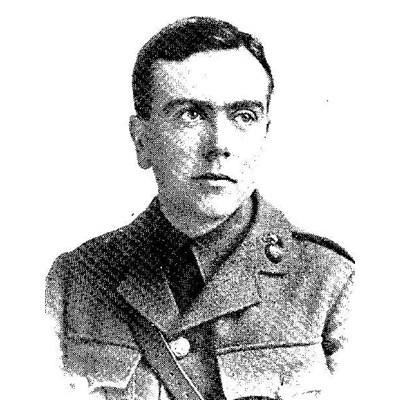Stewart, George ( - 1917)

Captain, 26th Bn. Northumberland Fusiliers
Buried at Arras Memorial
Commemorated at Hillhead High School
By the death in action of Captain George Stewart, head of the English Department, the School has suffered grievous loss. Though his term here has to be reckoned in months rather than in years, he made a deep and abiding impression on our School life. It is not easy to analyse the causes of this exceptional influence, but some at least lie on the surface.
For one thing, he was an incomparable teacher. He ruled his pupils as a magician, and seemed to rivet their attention by some occult charm of his own. He was at home with the great names in English literature, and had caught from them the breath and finer essence of all knowledge. With sure step he led his pupils into those realms of gold that stir the heart and quicken imagination, and seldom failed to inspire them with some of his own fine enthusiasm.
He was ever honest in his criticisms, and insisted that they should be the same. If he did not like a thing he said so, no matter what great or revered name was attached to it. He lived in and for his work, and threw himself with ardour into all the School activities-games, literary society, everything, indeed, that touched upon the corporate life and welfare of
the School. But the real secret of his power must be looked for neither in his knowledge nor in his zeal, but in his character. He radiated sincerity, earnestness, and moral strength, qualities that never fail to attract and hold young people. His very austerity, lit up though It was from time to time by a rich humour and a caustic wit, and his cloak of reserve, unveiled but rarely even to his intimates, marked him out as a man apart. The obvious does not appeal to pupils. Here was something of an enigma that baffled, yet attracted. But to
the simplest it was at least plain that here also was one who lived and worked
as ever in the Great Taskmaster's eye.
In March, 1915, Mr. Stewart applied for a commission, and in April was gazetted to the 26th Northumberland Fusiliers, the Tyneside Irish. Those who did not know Mr. Stewart well expressed surprise at his joining up so early. He had been a lover of books from his youth up. He had taken little or no part in games either as man or boy. War and strife were hateful to his well-ordered views of life. All this they knew, but they did not know that he hated injustice and unrighteousness still more, and held it to be not only a duty but a moral necessity to kill the accursed thing. It may be, too, as some of his friends think, that under the austere robe of the schoolmaster there burned the soul of the adventurer. His reading and his thinking had led him into the company of the happy warriors, and he followed in their tread with as light a step and high a heart as any paladin of old.
He proceeded to France in January, 1916, and had a long and trying experience in the trenches. In the great advance of 1st July, 1916, he was seriously wounded in the head and arm, and was in hospital at home for some months. At the beginning of 1917 he rejoined his regiment, and after a spell of light duty he returned to the Front in March, 1917.
He had not long been back with his old battalion when he was promoted acting captain. His letters from the Front were always bright and cheery, and the one written to his wife on the 5th June, the day of his death, was no exception to the rule. In it, with his usual consideration, he did not even say he was within the danger zone. The final scene may best be told in the words of his commanding officer,
"Your husband was out superintending the digging of a new trench across No Man's Land, and was killed by a shell. The battalion can ill afford to lose such an officer, cool, quiet, brave under all circumstances, with a wonderful devotion to duty, he was loved and respected by us all; his thoughts were always for the good of those under him, and it is small wonder that the men had such great trust and faith in him."
This is a striking tribute, and as true of Mr. Stewart, the teacher, as of Captain Stewart, the soldier. As a colleague the headmaster would like to say of him in addition that he never made difficulties, and he always saw opportunities.
In him he has lost not only a valued colleague, but a dear friend.




